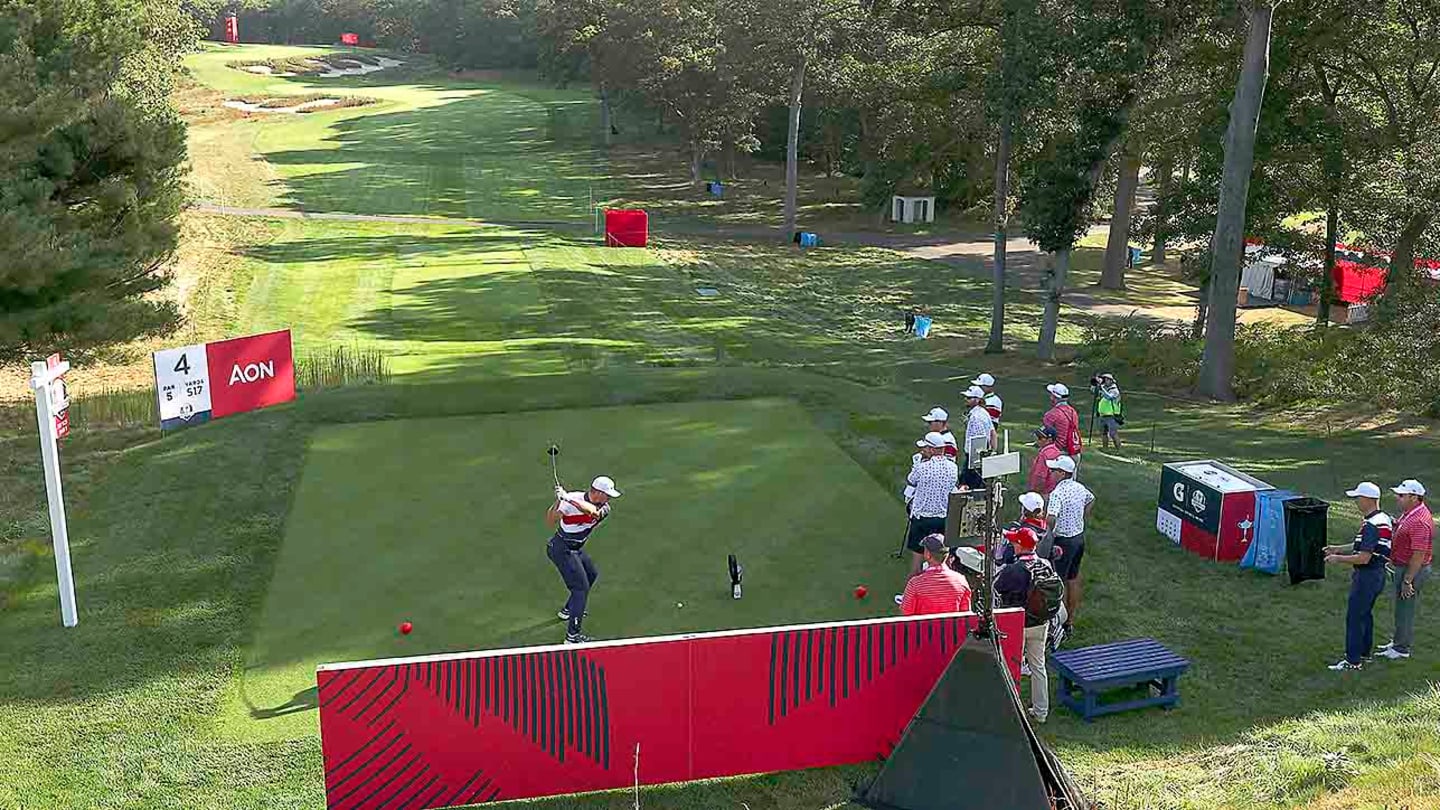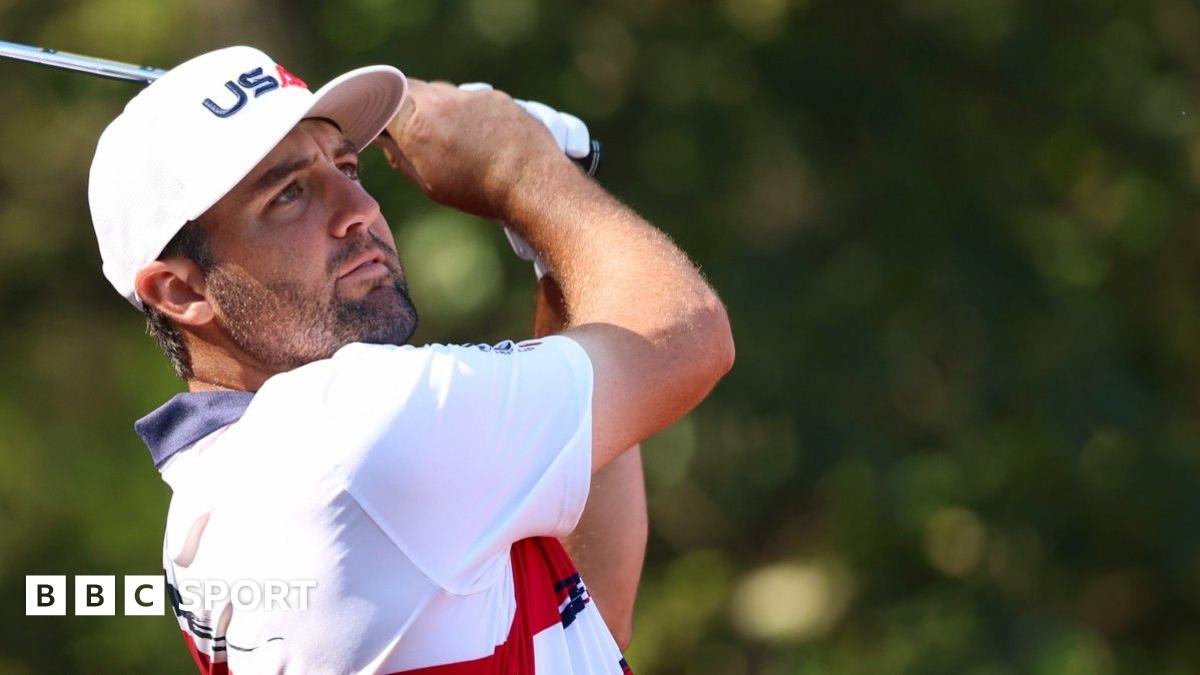A year ago, when Keegan Bradley was asked by the PGA of America to be the captain of the United States Ryder Cup team, it came as a surprise to many, most notably Keegan Bradley. He had never even considered the idea until he received that phone call. But it was not the kind of offer you turn down, especially when you care about the Ryder Cup as much as he does.
Bradley made what felt like a prudent, mature decision not to select himself, even though the PGA of America told him they wanted him to be the first playing captain since Arnold Palmer in 1963. But we still don’t know what kind of captain Bradley will turn out to be. In truth, the bar for success isn’t particularly high on the American side. Bradley was actually greenside at Brookline in 1999 when the United States won its most memorable Ryder Cup on home soil, and as a 13-year-old, he watched the celebration on his father’s shoulders. It seemed like a fun exercise to look back at all the American Ryder Cup captains since that moment, remember what went right and what went comically wrong, and imagine where he might rank among them after the competition ends next week.
12. Zach Johnson (2023)
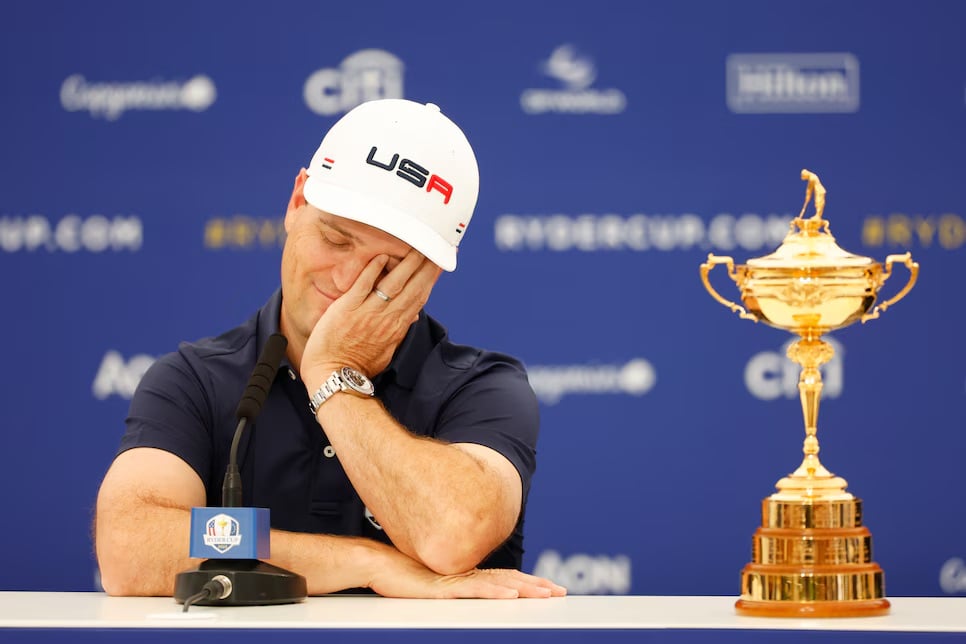
Where should we even begin? Incoherent messaging, garbled syntax, corncob enthusiasm. The allegations of Boys’ Club favoritism were so blatant, it felt like he was using Netflix to personally rub it in Keegan Bradley’s face that he wasn’t part of the #squad. While Europe was creating heartfelt videos of family members speaking directly to players about why they were playing for something bigger than themselves, the Americans were bringing country-rap artist Kelley James into the team room to make up funny songs. Zach threw Brooks Koepka and Scottie Scheffler together in foursomes with about a 30-minute heads-up, despite the fact that they’d never practiced together. His speeches were about as inspiring as the Iowa Hawkeyes’ offense, and in the end, his team scored about as many points. Somehow, he’s responsible for Keegan being kept off TWO Ryder Cup teams, even though he wasn’t involved in one of them. He did give us the “Don’t sir me!” meme, but it’s not enough to keep him out of the basement.
11. Tom Watson (2014)
Some of this isn’t his fault, because former PGA of America President Ted Bishop was trying to prove a point when he asked Watson to do a second stint as captain, figuring what the United States really needed was some tough love. But mercy, did that Boomer Logic ever backfire. Still the only captain to have his own team commit a mutiny, and one that went down in public no less. Shall we list everything that went wrong? Watson let Webb Simpson text his way onto the team on the eve of captain’s picks. He was apparently drawing up pairings on a napkin during the event. When his team tried to give him a replica Ryder Cup trophy as thanks, he allegedly told them, “It means nothing to me.” He started off his Saturday night speech with the words: “You stink at foursomes.” An entire task force had to be formed to clean up the mess. It’s a shame there is a generation of Ryder Cup fans who will only remember the look on his face as Phil Mickelson plunged a bayonet into his back because he’s still the last American captain to win on European soil (1993). When asked about Mickelson’s remarks, Watson not only dismissed them, but he also dismissed the Paul Azinger philosophy that had worked so successfully in 2008. “It takes 12 players to win,” Watson said. “It’s not pods.”
10. Hal Sutton (2004)
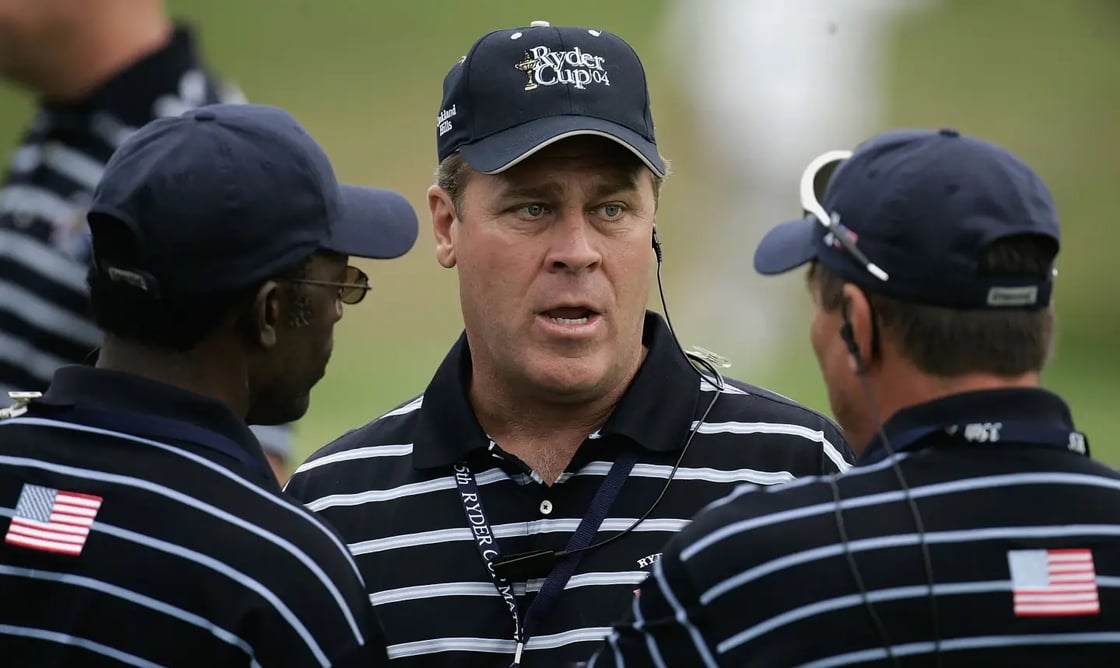
A captaincy so comically inept, if the European media were going to invent a parody of an American Ryder Cup captain, a tough-talking Texan wearing a cowboy hat who had been divorced four times would probably seem too on-the-nose. In theory, we could rank Sutton lower. He’s the only U.S. captain to get blown out at home. But in truth, the 2004 Ryder Cup team had no chance. Automatic qualifiers included Chris Riley, Kenny Perry, and Fred Funk, and one of Sutton’s captain’s picks was 50-year-old Jay Haas. Sutton knew Tiger and Phil didn’t want to be paired together, then went and did it anyway, but he didn’t tell them until two days before the competition, saying he hoped it might spark a friendship. Tiger sulked his way through the pairing and they lost both sessions. Sutton and Mickelson were still pointing fingers at one another 12 years after the fact. “Do you think I had anything to do with how poorly he played that way?” Sutton told Golf Digest. “Y’all remember how bad it was. He hit a 3‑wood against the fence on the last hole. A 3‑wood. A 3‑wood. That’s the story y’all need to be writing.”
9. Corey Pavin (2010)
As far as American Ryder Cup follies go, 2010 feels criminally underrated. But when you consider how close the event was (it came down to the final match), it’s hard not to lament what could have gone better. Everyone remembers the permeable rain suits, which forced the United States to buy new rain gear in the middle of the event from the merch tent, but few recall that the American rain suits were compromised because Pavin’s wife, Lisa, insisted on having the players’ names embroidered on the back, essentially turning them into a sieve. Lisa (whom the European media dubbed The Captainess) also picked out the infamous lavender sweaters and got into a shouting match with TV reporter Jim Gray for daring to suggest Pavin had told Tiger Woods was guaranteed a captain’s pick. Not sure it’s either Pavins’ fault the U.S. lost five of six matches in the third session, but it feels like Corey deserves to shoulder more of it than poor Hunter Mahan, who was already dormie in his singles match even before he flubbed his infamous chip on 17.
8. Jim Furyk (2018)
In terms of pure entertainment, this captaincy was a doozy. Let’s start with his first three captain’s picks (Tiger, Byrson, Phil). Somehow, this trio went 0-4, 0-3, and 0-2. Nothing has summed up America’s 30 years of misery in Europe better than Mickelson conceding his match to Francesco Molinari while ripples of his ball hitting the water on the 16th hole at Le Golf National were still visible. His other captain’s pick was Tony Finau, who wasn’t terrible, but it meant leaving Xander Schauffele at home on a course where driving accuracy was paramount. Instead, we got to witness Phil and Bryson hitting irons into hazards in alternate shot. Furyk doesn’t deserve blame for Patrick Reed begging to play with Tiger Woods, then claiming to the New York Times after the event ended that he felt betrayed that his partnership with Jordan Spieth was severed. “He knew who he was playing with, and that’s all I’ll say,” Furyk told ESPN, months after the Ryder Cup. And he certainly isn’t to blame for Dustin Johnson and Brooks Koepka allegedly almost coming to blows on the airplane home from France. But it was pretty evident the team room was far from harmonious. Did we mention Tiger Woods nearly fell asleep in the press conference after it ended? Sadly, that kind of sums up the Furyk captaincy.
7. Tom Lehman (2006)
Tiger made no secret about the fact that he wanted Mark O’Meara to get the job in 2006, but in the end, it was probably good for O’Meara that he was passed over because the squad that went to the K Club in Ireland put up an all-time stinker. It’s hard to pin much of it on Lehman, considering Brett Wetterich, Vaughn Taylor, and J.J. Henry made the team as automatic qualifiers. But he did leave Davis Love III at home for the first time since 1993, and selected 42-year-old Scott Verplank with his final captain’s pick, despite the fact that Verplank was 20th in the standings. Down 10-6 going into singles, Lehman tried to invoke memories of Brookline in 1999. The U.S. responded by winning just two of the 12 singles matches.
6. Curtis Strange (2002)
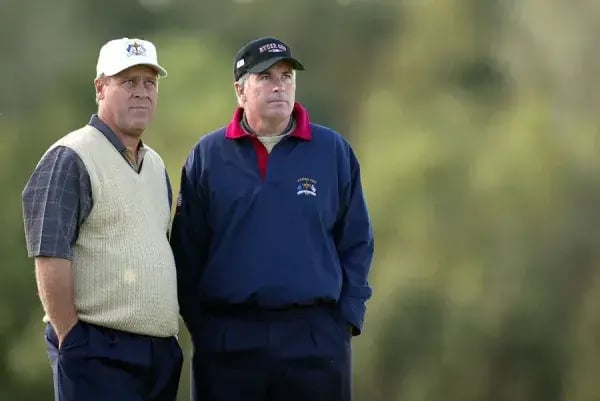
Is Strange the American captain with a 0.0 WAR? Here is the case to be made in favor of that statement. Going into the Sunday singles session of the 2002 Ryder Cup, the U.S. and Europe were tied 8-8. Do you know how rare that is? The United States has trailed going into singles in every other European Ryder Cup dating back to 1981. Strange is the only American captain to ever pick foursome pairings that worked in Europe. America got 4.5 points to Europe’s 3.5 points over two sessions. This was the chance to break the streak! Alas, here would be the case that Strange ultimately has a negative WAR: He picked Paul Azinger with his final captain’s pick, passing over Tom Lehman, and Azinger earned just half a point. Lehman later stated that he believed Strange didn’t take him because Sam Torrance accused him of leading the charge onto the 17th green at Brookline, and Strange was trying to put the controversy behind the United States. Strange also sent Scott Hoch out first in singles, and he set the tone for the day by getting blitzed, 5 and 4, by Colin Montgomerie.
5. Davis Love III (2012)
It seems only fair to rank the two DLIII captaincies separately. How you feel about the first one being ranked this high probably depends on what responsibility, if any, you think Love bears for the Sunday collapse when the U.S. blew a 10-6 lead. I would argue he deserves at least some, because he committed the same folly so many American captains have committed: essentially rendering Tiger Woods irrelevant by sending him off late in the line-up. How different does Sunday at Medinah feel if Woods goes out first instead of Bubba Watson? Love did almost everything else right in 2012, and in his defense, it took a series of improbable dominoes to fall for Europe to win. If Rory McIlroy doesn’t receive a police escort to the course from his future wife, Europe has to disqualify him, and they lose. If Ian Poulter doesn’t make five straight birdies at golden hour on Saturday, Europe doesn’t even have a chance to rally. If Justin Rose doesn’t make a 40-foot bomb from nearly off the green against Phil on Sunday, he likely halves or loses his match. Love brought stability and competency back to the role, and likely deserved another shot despite the collapse.
4. Steve Stricker (2021)
If this list was only about results, Stricker would probably be in the top spot. He was the architect behind the most definitive beatdown of the last quarter century. But he had some advantages that are important to remember in context. COVID restrictions meant European fans weren’t allowed to travel to the United States, which turned the normal home-field advantage into a tidal wave. Europe was also transitioning from one generation of stars to the next, and Lee Westwood, Ian Poulter, and Paul Casey stuck around for one cycle too long. Rory McIlroy and Viktor Hovland did not look like themselves. But Stricker also understood the personality of his team better than any modern captain. The Dustin Johnson/Collin Morikawa pairing was genius. He wasn’t swayed by the social media campaign to pick Kevin Kisner with his final captain’s pick and instead went with Scottie Scheffler, even though Scheffler had yet to win on the PGA Tour. He likely had the smallest ego of any captain to ever hold the job on the U.S. side, and he cut out all the nonsense that usually bogs down the Americans. No galas, no dinners, no meet-and-greets. Just golf.
{{inline-article}}
3. Davis Love III (2016)
Why did Love get a second chance after Medinah? Remember, it was the height of the Task Force Era. Tiger and Phil weren’t quite ready to ascend to the captaincy, but they were eager to pull some strings behind the scenes and Love is one of the few people in golf who can get them to play nice with each other. A version of the pod system quietly returned, and Woods, Furyk, Stricker, and Lehman each got to oversee their “guys.” Despite a ton of pressure on his shoulders, Love basically played every hand correctly, including letting Bubba Watson tag along as an assistant captain when he didn’t make the team. It took a superstar performance from Rory McIlroy just to keep Europe in it for the first two days, but even that wasn’t enough. Love didn’t repeat the mistake he made in Medinah, saving his best players for late Sunday. He sent Patrick Reed out first, and when Reed defeated McIlroy, 1 up, the wind essentially went out of Europe’s sails. If there is one minor quibble, it’s this: Apparently, Love was poised to take a 23-year-old Justin Thomas with his last captain’s pick, but Ryan Moore’s performance in the Tour Championship made it hard for Love to justify leaving him at home. Moore went 2-1-0, but in retrospect would have been great to get Thomas in the mix one cycle earlier, considering he’s now considered the heartbeat of the American side.
2. Ben Crenshaw (1999)
You probably remember the defiant finger wag, and Crenshaw’s insistence that he “had a feeling” something special was unfolding Saturday night, which might as well be the Gettysburg Address of American golf. What you might not remember is that Crenshaw was livid with some of the top guys on his team in the days leading up to the event (Woods, Mickelson, David Duval, Mark O’Meara) and essentially questioned their patriotism during an infamous pre-tournament press conference because they dared grumble that players weren’t being compensated for their participation in the Ryder Cup. “It burns the hell out of me to listen to some of their viewpoints,” Crenshaw said. “People are sick of issues like this in the sports world. When you can’t just show up and play for your country, I don’t know. If that’s not reward enough, then my heart bleeds for the game of golf.” The lecture seemed to backfire as his team fell behind 10-6, a deficit no team had ever recovered from. But on the final day, Gentle Ben completely outfoxed European captain Mark James by front-loading his lineup with Woods, Mickelson, and Love, and as momentum began to build, Europe began to panic. Your mileage may vary on whether or not you think Crenshaw deserves some of the blame for the early American celebration when Justin Leonard hit the putt heard ’round the world. But the image of him on his knees, kissing the 17th green, is as good as it gets.
1. Paul Azinger (2008)
To really appreciate Azinger’s captaincy, you have to remember the environment in which it occurred. The United States was coming off consecutive humiliations at the hands of Europe in 2004 and 2006. They’d lost eight of the last 11 cups. There was no broad strategy, no cohesion, no succession plan for captains. At Valhalla, the Americans were viewed as significant underdogs for the first time. Azinger, in many respects, injected some pride back into the American side. He revamped the selection process, he got the PGA of America to give him control of course setup (even cutting down a tree branch J.B. Holmes didn’t like), and he took a band of misfits (like Boo Weekly, Ben Curtis, and Anthony Kim) and used leadership techniques borrowed from Navy SEALs training and applied them to his golf squad. Instead of asking 12 players to be close friends, he divided them into pods: three teams of four guys in each. Those pods bonded and then picked apart Europe so thoroughly the U.S. led after every single session. Azinger’s approach was so popular with the players, Mickelson famously brought it up in his knifing of Tom Watson as evidence that the Americans had drifted away from what was successful. Azinger wanted to continue on as the captain, an approach Europe is taking with Luke Donald at the moment by asking him to run back-to-back cycles, but the PGA of America had other ideas.
{{inline-course}}
